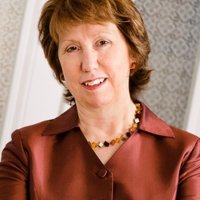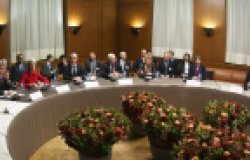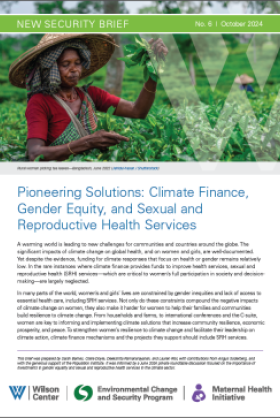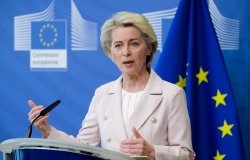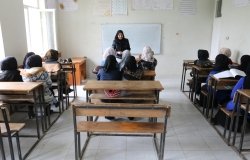She Is One Episode 1: Women at the Table
Behind every statistic, there is a story to tell.
An initiative of the Women in Public Service Project, She is One is sharing the stories of the women behind the numbers. Join the conversation using #SheIsOne.
Learn more about the numbers driving global gender parity with our Global Women's Leadership Initiative Index.
In this episode, Baroness Catherine Ashton and Ambassador Wendy R. Sherman, both key negotiators in the 2015 Iran nuclear deal, discuss the role of women as mediators in each and every aspect of their lives. Baroness Ashton was appointed as the first woman to be a British European Commissioner and became the first woman Commissioner for Trade in the European Commission. Also one of the women pioneers in her field, Ambassador Sherman led the U.S. negotiating team in her role as the first woman Undersecretary of State for Political Affairs at the U.S. Department of State.
From negotiation colleagues to friends in real life, Baroness Ashton and Ambassador Sherman together acknowledge the tremendous amount of work involved when women leaders take on multiple roles in their families as well as professions. Among different ways to manage well under that pressure, both agree that building a strong network of support will enable women to fulfill their personal obligations as well as move forward in their careers.
In terms of intention, Baroness Ashton believes that women go into their field because of their genuine interests in people’s lives rather than looking for credit or validation. Based on her extensive experience in world trade and negotiations, she noted that having both women and men around the table creates better dynamics and therefore generates more diverse approaches to solving problems. But even with this empirical fact in mind, Ashton understands that within the public service domain, certain social and self-driven constraints are holding women back. For example, many women take on more family responsibilities in their personal lives at the same time opportunities to advance come up in their professional lives.
Speaking of the current progress of women participation in public office, Baroness Ashton highlights the need for a “critical mass” in order for change to take place in public policy and foreign affairs. “With the best ones in the world, having two [women] in a room of a hundred men isn’t going to do it,” she said. On a very rare occasion, Ashton would tell the one man sitting in a room full of women, “now you know how we feel, except it happens to you one time today but it happens to me all week,” she said.
In making this “critical mass” a reality, one of the next actionable steps is to nurture the next generation of women leaders. “When a young woman wants 15 minutes of my time, she’s got it,” Sherman emphasized. She is hopeful that by letting these women know they can do it and they can have all the support they need, noticeable change will begin to take shape. She advises women to not only be tough-skinned but also be authentic to who they are. Sherman shared that she would cry in the middle of a negotiation if she’s angry because that’s her way of bringing alternative ideas to the discussion.
According to Sherman, while women should prepare themselves for a bumpy road full of dismissals and discrimination ahead, it’s crucial that they are confident about the values they represent, believe in their own power, and master a core skill set that will allow them to tackle any new terrain along the way. Most importantly, they should never neglect the loved ones who matter most to them at the end of the day and appreciate their unconditional support.
Guests

Global Women's Leadership Initiative
The Global Women’s Leadership Initiative has hosted the Women in Public Service Project at the Wilson Center since June, 2012. The Women in Public Service Project will accelerate global progress towards women’s equal participation in policy and political leadership to create more dynamic and inclusive institutions that leverage the full potential of the world’s population to change the way global solutions are forged. Read more


